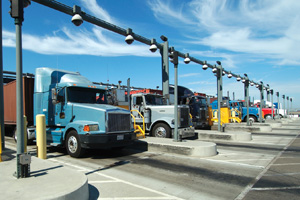Judge Approves Port of L.A.’s ‘Clean Truck’ Program

A federal judge late Thursday upheld the Port of Los Angeles’ “clean trucks” plan to require drivers moving through the port to comply with hiring and maintenance rules.
In a 57-page ruling, U.S. District Judge Christina Snyder rejected arguments from American Trucking Associations that had argued the plan was not in compliance with federal laws dealing with transportation safety and interstate commerce.
ATA said Friday will appeal the ruling. “We are disappointed with the decision, and believe it is clearly erroneous as a matter of law,” the trucking group said in a statement.
ATA also plans to ask the court to maintain the legal status quo, keeping in place an injunction against the port’s ban on independent owner-operators, off-street parking, and other provisions until an appeals court reviews the case.
Snyder ruled that the employee provision would ensure that drivers have the available funds to maintain the environmentally friendly truck fleet, protecting the port’s financial investment in subsidized vehicles, the Los Angeles Times reported.
The port spent more than $57 million to bring new, cleaner-burning trucks into the port, much of it in the form of subsidies for companies purchasing new vehicles, the paper said.
The ruling said the port’s concession agreements were a “business necessity” that allowed harbor officials to protect its financial interests, and that air pollution from trucks had jeopardized the port’s future as a commercial enterprise, with lawsuits over emissions stalling growth at the harbor for seven years, the Times reported.
ATA filed suit in 2008 in attempting to block the port’s diesel emissions reduction plan, which calls for a phased-in requirement that all drayage truck drivers be company employees rather than independent contractors. (Click here for previous story.)
“There is a federal law that says states and localities can’t impose laws and regulation on motor carriers that affect their rates, routes and services,” Robert Digges, vice president and chief counsel for ATA, told Transport Topics following conclusion of the trial in late April.




